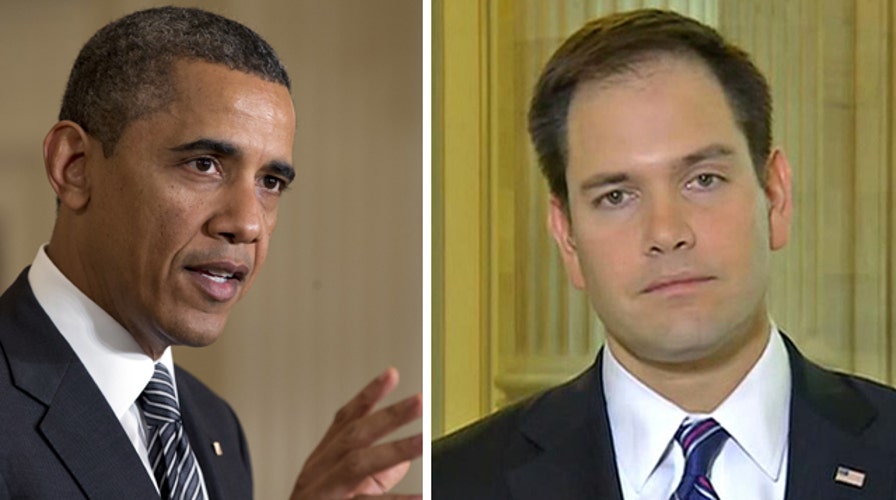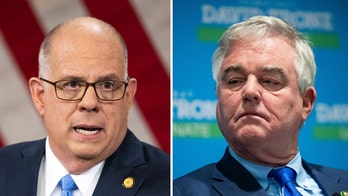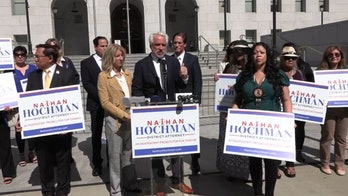Rubio: We're not having an immigration bidding war
GOP senator on bipartisan proposal, president's agenda
President Obama said Tuesday that "now's the time" for immigration reform, using an address in Las Vegas to try and energize renewed talks in Congress toward comprehensive legislation.
"I'm here today because the time has come for common-sense comprehensive immigration reform," Obama said.
The president, setting out to achieve an immigration overhaul where many before him have failed, was running into trouble even before he gave his address. Sen. Marco Rubio, R-Fla., one of four Republican senators involved in a bipartisan effort to craft immigration legislation, earlier in the day blasted Obama for opposing a requirement to shore up border security before legalizing up to 11 million illegal immigrants.
Obama's speech, and a separate fact sheet handed out by the White House, made clear that the administration does not want to link the path to citizenship to border enforcement.
The president said Tuesday that in order for immigration reform to work, "It must be clear from the outset that there is a pathway to citizenship."
The comment, albeit subtle, was an apparent reference to a provision in the Senate blueprint that would not let illegal immigrants seek citizenship until border security is strengthened. Obama said that his conditions would only involve the illegal immigrants themselves -- he said that they would have to submit to a background check, pay back taxes and fines, learn English and get in the back of the line in order to apply.
The president described his plan as "earned citizenship."
Obama claimed a "broad consensus" was emerging on the issue itself, calling the plan outlined by Rubio and others "very much in line" with his own -- aside from the path-to-citizenship provision. "For the first time in many years, Republicans and Democrats seem ready to tackle this problem together," he said, calling legislation "within our grasp."
He said any plan should include the path to citizenship, but also a crackdown on employers who knowingly hire undocumented workers -- and a better system for verifying the status of those workers. He also called for streamlining the legal immigration system, providing visas for foreign entrepreneurs and retaining sought-after science and math graduate students.
The president has run into complaints from conservatives that his plan is tantamount to "amnesty."
But the most problematic objection so far has come from Rubio -- a prominent Hispanic conservative who is vital to the bipartisan effort on Capitol Hill.
Speaking on Fox News on Tuesday, Rubio insisted that illegal immigrants not be allowed to obtain green cards -- let alone citizenship -- "until the enforcement stuff is in place."
"I think that would be a terrible mistake," Rubio told Fox News. "We have a bipartisan group of senators that have agreed to that. For the president to try to move the goalposts on that specific requirement, as an example, does not bode well in terms of what his role's going to be in this or the outcome."
He said: "If that's not in the bill, I won't support it."
Obama stressed Tuesday that if Congress cannot move forward "in a timely fashion," he will submit a proposal drafted by the White House.
Amid the exchanges, Republicans congressional leaders expressed a willingness to debate the issue while cautioning against Obama getting too involved.
"There are a lot of ideas about how best to fix our broken immigration system," House Speaker John Boehner said in a statement. "Any solution should be a bipartisan one, and we hope the president is careful not to drag the debate to the left and ultimately disrupt the difficult work that is ahead in the House and Senate."
The issue of immigration reform was put on the back burner during Obama's first term -- overtaken by debate over health care legislation and economic measures. But along with gun control, it is one of the top items on his second-term domestic agenda.
The eight U.S. senators got ahead of him Monday, unveiling a blueprint that calls for, among other things, a path to citizenship for the 11 million illegal immigrants already in the United States.
But White House Press Secretary Jay Carney said the president "welcomes" the proposal, saying it represents the "bipartisan support coalescing" behind certain principles of immigration reform.
Despite the difference over the path to legal status, an Obama administration official told Fox News the senators' plan is on a trajectory that mirrors Obama's immigration plan in many ways, and that the White House is willing to let the group take the lead.
Sen. Chuck Schumer, D-N.Y., one of the eight senators, called the new proposal a "major breakthrough" and said he hopes to turn it into legislation by March -- with the goal of passing something out of the Senate "by late spring or summer."
Sen. John McCain, R-Ariz., standing beside him, claimed 2013 is the "best chance" lawmakers will have to tackle immigration for years.
Even so, the proposed pathway to citizenship for illegal immigrants drew immediate criticism from others on Capitol Hill.
"No one should be surprised that individuals who have supported amnesty in the past still support amnesty," Rep. Lamar Smith, R-Texas, said. "By granting amnesty, the Senate proposal actually compounds the problem by encouraging more illegal immigration."
The eight senators who unveiled the new principles are Democrats Schumer, Dick Durbin of Illinois, Robert Menendez of New Jersey and Michael Bennet of Colorado; and Republicans McCain, Lindsey Graham of South Carolina, Rubio of Florida and Jeff Flake of Arizona.
The Senate framework would also require those here illegally to pass background checks and pay fines and taxes in order to qualify for a "probationary legal status" that would allow them to live and work here -- but not qualify for federal benefits -- before being able to apply for permanent residency, a critical step toward citizenship. Once they are allowed to apply they would do so behind everyone else already waiting for a green card within the current immigration system.
Senators also want to reform the legal immigration system, including awarding green cards to immigrants who obtain advanced degrees in science, math, technology or engineering from an American university.
The principles released Monday are outlined on just over four pages, leaving plenty of details to fill in.
The Associated Press contributed to this report.





